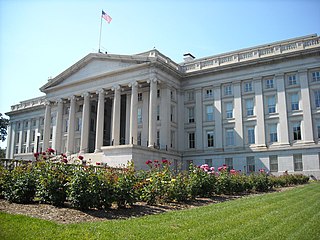Related Research Articles

The economy of the Cayman Islands, a British overseas territory located in the western Caribbean Sea, is mainly fueled by the tourism sector and by the financial services sector, together representing 50–60 percent of the country's gross domestic product (GDP). The Cayman Islands Investment Bureau, a government agency, has been established with the mandate of promoting investment and economic development in the territory. Because of the territory’s strong economy and it being a popular banking destination for wealthy individuals and businesses, it is often dubbed the ‘financial capital’ of the Caribbean.

Banking in Switzerland dates to the early 18th century through Switzerland's merchant trade and has, over the centuries, grown into a complex, regulated, and international industry. Banking is seen as emblematic of Switzerland. The country has a long history of banking secrecy and client confidentiality reaching back to the early 1700s. Starting as a way to protect wealthy European banking interests, Swiss banking secrecy was codified in 1934 with the passage of a landmark federal law, the Federal Act on Banks and Savings Banks. These laws, which were used to protect assets of persons being persecuted by Nazi authorities, have also been used by people and institutions seeking to illegally evade taxes, hide assets, or generally commit financial crime.

An offshore bank is a bank that is operated and regulated under international banking license, which usually prohibits the bank from establishing any business activities in the jurisdiction of establishment. Due to less regulation and transparency, accounts with offshore banks were often used to hide undeclared income. Since the 1980s, jurisdictions that provide financial services to nonresidents on a big scale can be referred to as offshore financial centres. OFCs often also levy little or no corporation tax and/or personal income and high direct taxes such as duty, making the cost of living high.
Offshore investment is the keeping of money in a jurisdiction other than one's country of residence. Offshore jurisdictions are used to pay less tax in many countries by large and small-scale investors. Poorly regulated offshore domiciles have served historically as havens for tax evasion, money laundering, or to conceal or protect illegally acquired money from law enforcement in the investor's country. However, the modern, well-regulated offshore centres allow legitimate investors to take advantage of higher rates of return or lower rates of tax on that return offered by operating via such domiciles. The advantage to offshore investment is that such operations are both legal and less costly than those offered in the investor's country—or "onshore".
A tax haven is a term, sometimes used negatively and for political reasons, to describe a place with very low tax rates for non-domiciled investors, even if the official rates may be higher.

Ugland House is a building located in George Town, Cayman Islands. Located at 121 South Church Street, the building is occupied by the law firm Maples and Calder and is the registered office address for 40,000 entities, including many major investment funds, international joint ventures and capital market issuers.
The Mauritius route is a channel used by foreign investors to invest in India. Mauritius is the main provider of foreign direct investment (FDI) to India and also the preferred jurisdiction for Indian outward investments into Africa. In fact 39.6% of FDI to India came from Mauritius between 2001 and 2011.
The Financial Secrecy Index (FSI) is a report published by the controversial advocacy organization Tax Justice Network (TJN) which ranks countries by financial secrecy indicators, weighted by the economic flows of each country.
The Global Forum on Transparency and Exchange of Information for Tax Purposes was founded in 2000 and restructured in September 2009. It consists of OECD member countries as well as other jurisdictions that have agreed to implement tax related transparency and information exchange. The forum works under the auspices of the OECD and G20. Its mission is to "implement the international standard through two phases of peer review process". It addresses tax evasion, tax havens, offshore financial centres, tax information exchange agreements, double taxation and money laundering.

The Foreign Account Tax Compliance Act (FATCA) is a 2010 U.S. federal law requiring all non-U.S. foreign financial institutions (FFIs) to search their records for customers with indicia of a connection to the U.S., including indications in records of birth or prior residency in the U.S., or the like, and to report such assets and identities of such persons to the United States Department of the Treasury. FATCA also requires such persons to report their non-U.S. financial assets annually to the Internal Revenue Service (IRS) on form 8938, which is in addition to the older and further redundant requirement to report them annually to the Financial Crimes Enforcement Network (FinCEN) on form 114. Like U.S. income tax law, FATCA applies to U.S. residents and also to U.S. citizens and green card holders residing in other countries.
Financial services in Gibraltar refers to the services provided in the British Overseas Territory of Gibraltar by the finance industry: banks, investment banks, insurance companies, credit card companies, consumer finance companies, government-sponsored enterprises, and stock brokerages.

The Swiss Banking Act or Federal Act on Banks and Savings Banks is a Swiss federal law and act-of-parliament that operates as the supreme law governing banking in Switzerland. Although the federal law has only been amended seven times, it has been revised multiple times to limit and expand its banking secrecy provisions since its ratification. The banking secrecy provisions in the Federal Act are additionally enforced through multiple civil codes in the federal Swiss Civil Code and locally through cantonal law. In December 2017, the Swiss parliament launched a standing initiative and expressed an interest in formally embedding banking secrecy within the Swiss Federal Constitution rendering it a federally-protected constitutional right.
The FATCA agreement is an international agreement signed between Canada and the United States that allows the implementation of the Foreign Account Tax Compliance Act in Canada. It is one of 30 intergovernmental agreements the US has concluded with other countries to implement the FATCA.
The Common Reporting Standard (CRS) is an information standard for the Automatic Exchange Of Information (AEOI) regarding financial accounts on a global level, between tax authorities, which the Organisation for Economic Co-operation and Development (OECD) developed in 2014.

Base erosion and profit shifting (BEPS) refers to corporate tax planning strategies used by multinationals to "shift" profits from higher-tax jurisdictions to lower-tax jurisdictions or no-tax locations where there is little or no economic activity, thus "eroding" the "tax-base" of the higher-tax jurisdictions using deductible payments such as interest or royalties. For the government, the tax base is a company's income or profit. Tax is levied as a percentage on this income/profit. When that income / profit is transferred to another country or tax haven, the tax base is eroded and the company does not pay taxes to the country that is generating the income. As a result, tax revenues are reduced and the government is detained. The Organisation for Economic Co-operation and Development (OECD) define BEPS strategies as "exploiting gaps and mismatches in tax rules". While some of the tactics are illegal, the majority are not. Because businesses that operate across borders can utilize BEPS to obtain a competitive edge over domestic businesses, it affects the righteousness and integrity of tax systems. Furthermore, it lessens deliberate compliance, when taxpayers notice multinationals legally avoiding corporate income taxes. Because developing nations rely more heavily on corporate income tax, they are disproportionately affected by BEPS.
The Republic of Panama is one of the oldest and best-known tax havens in the Caribbean, as well as one of the most established in the region. Panama has had a reputation for tax avoidance since the early 20th century, and Panama has been cited repeatedly in recent years as a jurisdiction which does not cooperate with international tax transparency initiatives.
International tax planning also known as international tax structures or expanded worldwide planning (EWP), is an element of international taxation created to implement directives from several tax authorities following the 2008 worldwide recession.

Country-by-Country Reporting is an international initiative pioneered by the OECD. It establishes a reporting standard for multinational enterprises (MNEs) with total consolidated group revenues > EUR 750 million, containing key tax related information, including financial information and information on employees and non-cash tangible assets. Under the OECD rules, the information is to be exchanged between tax authorities of different countries. However, the EU adopted legislation to make the Country-by-Country Reporting publicly available, starting the year after 2024.
The Directive on Administrative Co-operation in the field of taxation is a Directive which sets rules for the Automatic Exchange of Information (AEOI) which apply to members of the European Union (EU).
The Crypto-Asset Reporting Framework is a global initiative led by the OECD Global Forum on Transparency and Exchange of Information for Tax Purposes which is intended to promoted the automatic exchange of information between countries to tackle emerging tax evasion risks related to cryptocurrency and digital assets.
References
- ↑ "Model Tax Convention on Income and on Capital".
- ↑ "Exchange of Information on Request: A robust and transparent review process".
- ↑ "Compliance ratings following peer reviews against the standard of exchange of information on request".
- ↑ "FATCA AGREEMENTS AND UNDERSTANDINGS BY JURISDICTION".
- ↑ "AEOI standard's implementation status by jurisdiction".
- ↑ "HMRC - Mandatory Disclosure Rules".
- ↑ "OECD Tax Transparency".
- ↑ "Global Forum on Transparency and Exchange of Information for Tax Purposes".
- ↑ "Additional Actions Are Needed to Address Non-Filing and Non-Reporting Compliance Under the Foreign Account Tax Compliance Act" (PDF).
- ↑ "COMMISSION STAFF WORKING DOCUMENT IMPACT ASSESSMENT Accompanying the document Proposal for a Council Directive amending Directive 2006/112/EC". EU Commission. Annex 6.